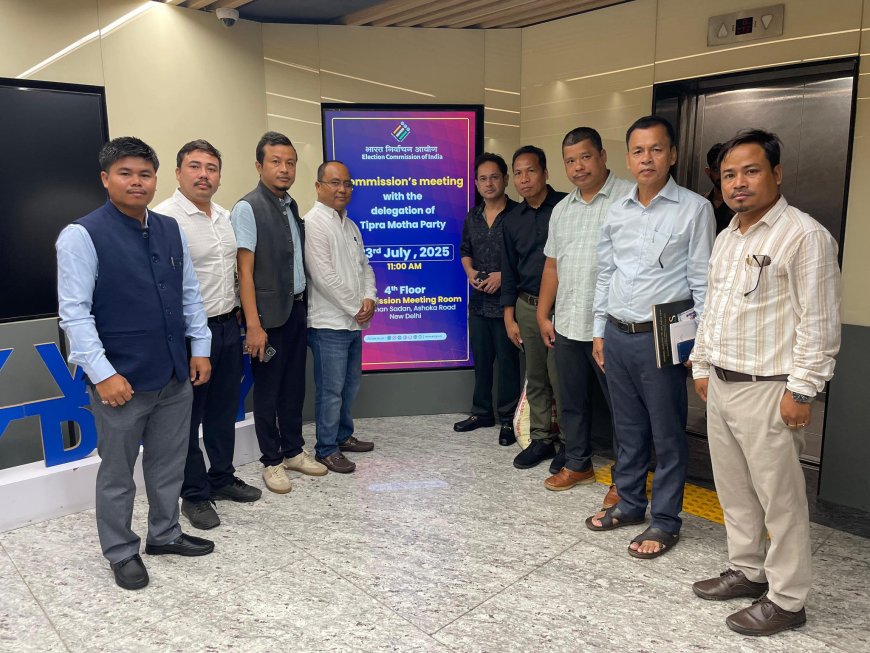Tipra Motha Delegation Meets ECI, Demands Revision of Tripura Voter Rolls; CEM Confirms CEC Assures Nationwide Review
A delegation from Tipra Motha Party, led by Pradyot Kishore Debbarma and TTAADC CEM Purna Chandra Jamatia, met the Chief Election Commissioner (CEC) of India in New Delhi. They demanded a Special Intensive Revision (SIR) of Tripura’s electoral rolls—similar to the Bihar model—through a door-to-door verification process, especially in tribal areas. This comes amid concerns over illegal migrants from Bangladesh and Myanmar being included in the voter list. CEM Jamatia confirmed that the CEC has assured a nationwide review, including in Tripura. Meanwhile, CM Manik Saha reiterated the state will follow the CAA cut-off date of December 31, 2014, rejecting Tipra Motha’s demand for a 1971 cut-off based on the Indira-Mujib Accord.

New Delhi, A high-level delegation of the Tipra Motha Party, led by party chairman Bubagra Pradyot Kishore Manikya Debbarma, today met the Chief Election Commissioner (CEC) of India at Nirvachan Sadan, New Delhi, to press for a Special Intensive Revision (SIR) of electoral rolls in Tripura, particularly in tribal areas governed by the Tripura Tribal Areas Autonomous District Council (TTAADC).
The delegation raised serious concerns about the inclusion of alleged illegal migrants from Bangladesh and Myanmar in the state's voter list, urging the Election Commission of India (ECI) to adopt the Bihar model of door-to-door verification ahead of the TTAADC elections and 2028 Assembly polls.
CEM Purna Chandra Jamatia: Door-to-Door Verification Demanded
Speaking after the meeting, TTAADC Chief Executive Member Purna Chandra Jamatia, who was part of the delegation, said:
“We, the delegation team of the Tipra Motha Party, under the leadership of Bubagra Pradyot Kishore Manikya Debbarma, met with the Chief Election Commissioner of India today in New Delhi. We urged the Election Commission to conduct a thorough review of the electoral roll in Tripura, following the Bihar model. We demanded a door-to-door verification process to ensure a clean and transparent electoral roll, especially in the tribal areas.”
CEM Jamatia added that the delegation highlighted discrepancies in the voter list, alleging the inclusion of ineligible and undocumented individuals.
In response, the Chief Election Commissioner reportedly assured the Tipra Motha delegation that a nationwide review of electoral rolls would be undertaken, and Tripura will be included in that process.
Background: The Cut-off Date Controversy
The demand for a voter roll revision stems from Tipra Motha’s long-standing opposition to the December 31, 2014 cut-off date under the Citizenship (Amendment) Act, 2019 (CAA). Instead, the party insists on the March 25, 1971 cut-off date as defined in the Indira-Mujib Pact of 1972, which recognized only those who took shelter in India before the Bangladesh Liberation War as legitimate refugees.
Tripura Chief Minister Dr. Manik Saha, however, has reaffirmed that the state government will stick to the 2014 cut-off, aligning with central policy under the CAA. He also cited the state’s surveillance-focused approach, including the formation of Special Task Forces (STFs) to address infiltration, rather than revising voter lists.
Comparison of Positions
| Issue | Tipra Motha’s Stand | State Government’s Position |
|---|---|---|
| Cut-off Date | 1971 (Indira-Mujib Accord) | 2014 (CAA) |
| Electoral Roll Revision | Bihar-style SIR, door-to-door verification | No formal revision announced |
| Engagement with ECI | Delegation met ECI on July 23 | Aligns with central stance |
| Legal/Policy Actions | Calls for removal of illegal migrants from rolls | Surveillance via STFs, no voter list review |
Tipra Motha may hold a press conference on July 24, 2025, to brief the public and media about the outcome of the meeting. While the ECI's assurance is seen as a positive signal, actual implementation of door-to-door verification in Tripura remains to be formally announced.
As the political landscape in Tripura shifts ahead of key elections, this meeting marks a significant step in Tipra Motha’s campaign to protect indigenous rights and electoral integrity.
By Sayani Mishra
